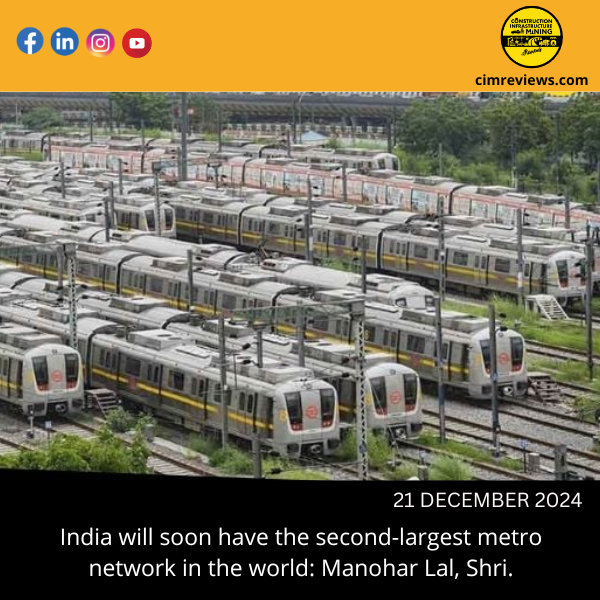Minister for Housing and Urban Affairs, Shri Manohar Lal, highlighted the government’s efforts to improve urban mobility and expand the urban transport network to address the challenges of a growing urban population.
The country currently has over 800 kilometers of operational metro lines, with more than 1,000 kilometers under various stages of construction. Once completed, this extensive expansion will position India ahead of many developed nations in terms of metro connectivity.
He shared that 993 kilometers of metro rail are currently operational in 23 cities, while another 997 kilometers are under construction in 28 cities. Shri Manohar Lal stated that India is poised to become home to the world’s second-largest metro network.
India Set to Become the Second-Largest Metro Network Globally: Shri Manohar Lal
India is rapidly expanding its metro rail network and is poised to become the second-largest metro system in the world, as stated by Shri Manohar Lal. With multiple metro projects under construction and several planned expansions, the country is investing heavily in modern urban transportation infrastructure.
Expanding Metro Network Across the Nation
India’s metro rail network has witnessed exponential growth in the last two decades. With major cities like Delhi, Mumbai, Bengaluru, Chennai, Hyderabad, and Kolkata already operating extensive metro systems, newer cities such as Pune, Ahmedabad,
Government Initiatives Driving Growth
The Indian government, under various metro rail policies, has been actively supporting the expansion of metro networks. Initiatives such as Shah emphasized the government’s commitment.
To improving the Northeast’s infrastructure and accelerating economic progress. These initiatives will improve rural connectivity, the Metro Rail Policy 2017 encourage private investments and public-private partnerships (PPPs) to facilitate the development of metro projects in different states.
The increased financial allocations in the Union Budget and state-level commitments have provided significant impetus to these projects. Moreover, the ‘Make in India’ initiative has encouraged the domestic manufacturing of metro components, leading to reduced costs and greater efficiency in project execution.
Sustainability and Technological Advancements
With a strong focus on sustainability, Indian metro projects are incorporating energy-efficient systems, solar-powered stations, and green building standards. Many metro networks have adopted regenerative braking technology, which helps save energy by feeding power back into the grid.
Additionally, advancements such as automated metro systems, artificial intelligence-based monitoring, and smart ticketing solutions are being introduced to enhance commuter experience and operational efficiency. vision to enhance urban mobility, reduce congestion, and promote eco-friendly transportation.
Economic and Environmental Impact
The expansion of the metro network is expected to bring significant economic benefits, including increased employment opportunities, enhanced real estate values near metro corridors, and improved business connectivity. By providing a reliable and efficient public transportation system.
Metros help reduce dependence on private vehicles, thereby cutting down traffic congestion and air pollution. In cities like Delhi and Mumbai, metro systems have significantly reduced travel time for millions of commuters, contributing to improved productivity and better quality of life. Nagpur, Kanpur, and Patna are joining the metro revolution. These developments are part of the government’s.
Challenges and Future Prospects
Despite the rapid progress, metro expansion in India faces challenges such as land acquisition issues, funding constraints, and project delays due to administrative and technical hurdles. However, with proactive policies, streamlined approval processes, and innovative funding mechanisms, these challenges are being addressed effectively.
Looking ahead, India aims to further integrate metro networks with other modes of transport, including buses and railways, to create a seamless and interconnected urban transit system. Plans for high-speed metro corridors and intercity metro linkages are also being explored to enhance regional connectivity.
Group Media Publication
Construction, Infrastructure and Mining
General News Platforms – IHTLive.com
Entertainment News Platforms – https://anyflix.in/





